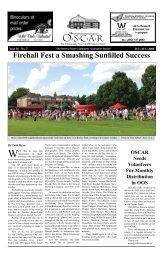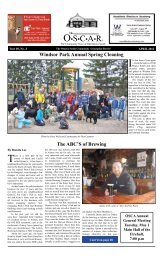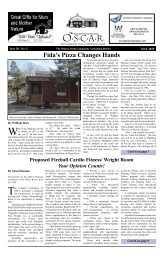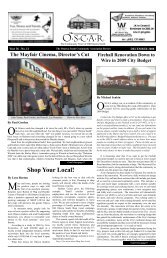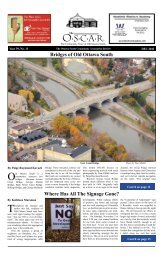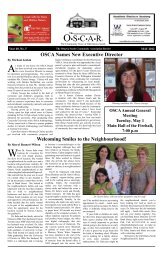Create successful ePaper yourself
Turn your PDF publications into a flip-book with our unique Google optimized e-Paper software.
Page 38 The OSCAR - OUR 37 th YEAR July 2010<br />
COMPUTER TRICKS AND TIPS<br />
By Malcolm and John<br />
Harding, of Compu-Home<br />
As we mentioned in our last<br />
column, slowdown is the<br />
most common problem<br />
we encounter. In that column we<br />
dealt primarily with software issues.<br />
This month, we’ll focus mostly<br />
on hardware. Your computer has<br />
a set amount of resources that are<br />
determined when you first buy it.<br />
There lots of bits and pieces that make<br />
up the hardware of your computer, but<br />
there a key few that specifically affect<br />
its speed.<br />
The Processor is the main “brain”<br />
of the computer. It has a set speed that<br />
is measured in GigaHertz (GHz). The<br />
number roughly specifies the number<br />
of calculations it can do per second.<br />
The higher the number is, the faster<br />
the computer is. That initial speed<br />
will not change over time, and it is<br />
not usually feasible to replace your<br />
processor with a faster one down the<br />
road.<br />
The RAM could be described<br />
as temporary storage... the shortterm<br />
memory. Your computer has a<br />
certain amount of RAM, measured<br />
in Megabytes or Gigabytes. Every<br />
time you double-click an icon to start<br />
a program, that program is loaded<br />
Carleton University has become<br />
the first post-secondary<br />
institution in Canada to<br />
establish a graduate program in<br />
political management. The university<br />
announced the creation of the new<br />
program in early June. The initiative<br />
was made possible by a $15-million<br />
financial commitment – the largest<br />
in Carleton’s history – from Alberta<br />
businessman Clayton Riddell. To<br />
honour Mr. Riddell’s generosity<br />
and dedication to public policy, the<br />
program will be named the Clayton H.<br />
Riddell Graduate Program in Political<br />
Management. As with all new<br />
graduate degree programs, its design<br />
will be appraised for approval by the<br />
Ontario Council on Graduate Studies.<br />
It’s expected that students will start to<br />
be accepted into the new program in<br />
September 2011.<br />
Another new initiative on campus in<br />
Even After Last Month’s Amazing Column<br />
My Computer is Still Too Slow!!<br />
into RAM. When you close that<br />
program and start a new one, the<br />
new program is loaded into RAM<br />
and takes the place of the previously<br />
running program. As we mentioned<br />
last month it is often possible to add<br />
more RAM quickly and cheaply,<br />
and the resulting increase in speed is<br />
significant.<br />
The Hard Drive is the storage<br />
locker on your computer. Hard Drives<br />
are measured in Gigabytes. The<br />
number of Gigabytes determines how<br />
much storage space you have. That<br />
space is occupied by your Operating<br />
System, your programs (MS Office,<br />
Internet Explorer, Skype, etc.) and,<br />
most importantly, your personal data,<br />
which usually consists of documents,<br />
pictures, music, and records. Hard<br />
Drives can be upgraded or replaced<br />
if need be, but that will not likely<br />
affect your speed very much. They<br />
are generally only replaced due<br />
to hardware failure or inadequate<br />
capacity for your personal data. One<br />
key misconception about hard drives<br />
is that if you have a lot of data then<br />
your computer will be slower. This is<br />
not in fact true anymore. Computers<br />
used to have very small hard drives<br />
and were constantly filling up, and<br />
the only time the hard drive will slow<br />
down your computer is when it is<br />
CARLETON CORNER<br />
June was the official launch of the<br />
online version of Carleton Now, the<br />
university’s monthly newspaper. It’s<br />
the first publication at the university<br />
to go completely paperless. The move<br />
marks a new direction for several<br />
Carleton publications. To view and<br />
subscribe to Carleton Now, please go<br />
to: http://carletonnow.carleton.ca.<br />
There was also some change in<br />
the Carleton hockey team’s coaching<br />
staff. The departure of Fred Parker<br />
initiated a search for his replacement.<br />
On June 7, Athletics Director Jennifer<br />
Brenning announced that Ravens<br />
assistant hockey coach Marty Johnston<br />
will take over coaching duties.<br />
Several faculty and students<br />
received accolades in June, including<br />
Prof. Linda Duxbury, who received<br />
the 2010 President’s Award from the<br />
International Personnel Management<br />
Association – Canada. This award<br />
filled very close to its capacity.<br />
Let’s also look at some speedrelated<br />
mythology – red herrings and<br />
the grains of truth behind them:<br />
Red Herring 1: Having a large<br />
number of pictures, music, documents,<br />
icons on the Desktop, etc. will slow<br />
your computer. As stated above, your<br />
computer’s speed is not affected by<br />
stored data until it is very nearly full.<br />
Grain of Truth: Data saved within<br />
a program can affect the speed of that<br />
program... but only that program. A<br />
prime example of this is your e-mail<br />
program, such as Outlook Express.<br />
If you have a lot of messages,<br />
attachments, folders, calendar items,<br />
to-do lists, etc. that program can<br />
be slow to load and sluggish to use,<br />
because the data is saved right within<br />
the program, unlike the majority of<br />
programs, which save files separately.<br />
Red Herring 2: Paying for high/<br />
higher speed internet will make your<br />
computer faster. We hear many<br />
clients say that they have changed to a<br />
faster/more expensive internet service<br />
but that their computer is no faster.<br />
Grain of Truth: Faster internet<br />
service will make web content get to<br />
your computer faster. The rub there is<br />
that if your computer itself is slow to<br />
begin with, then having internet traffic<br />
flooding in faster will not result in a<br />
has not been presented since 2006.<br />
It is IPMA-Canada’s highest award<br />
and is presented to an individual who<br />
has made an outstanding contribution<br />
to the practice of human resources<br />
management in Canada.<br />
The university was also proud to<br />
announce that second-year journalism<br />
student, Daniel Fish, received the<br />
2010 Kenneth R. Wilson Award. Fish<br />
and his co-authors, Annette Bourdeau<br />
and Jim McElgunn, received a silver<br />
award in the category of Best How-<br />
To Article or Series of How-To<br />
Articles for their article How to be<br />
a Superpreneur which appeared in<br />
Profit Magazine. The awards are coproduced<br />
by the Canadian Business<br />
Press and Magazines Canada.<br />
Carleton and the University of<br />
<strong>Ottawa</strong> are hosting top university<br />
students from India who are in Ontario<br />
from May to July. The group of 47<br />
better browsing experience. (Internet<br />
experience is an especially confusing<br />
subject as related to speed issues,<br />
because there are so many variables<br />
interacting – computer, Internet<br />
connection, and the website itself.)<br />
Red Herring 3: I’ve got to get rid<br />
of all of those cookies, because there<br />
are so many of them that they are<br />
slowing things down.<br />
Grain of Truth: Cookies are not<br />
actually considered by most experts<br />
to be spyware. They are in a mostly<br />
benign category and can actually<br />
make your browsing experience more<br />
efficient, by remembering your login<br />
information for sites and getting you<br />
back to your favourites more quickly.<br />
While they may compromise your<br />
privacy in some circumstances, they<br />
are not actually a slowdown issue.<br />
Have a great summer. See you in<br />
the fall.<br />
Malcolm and John Harding are<br />
owners of Compu-Home. They assist<br />
home and business computer users.<br />
Be sure to visit our new web site<br />
for an archive of our Tips & Tricks.<br />
www.compu-home.com<br />
Write to harding@compu-home.<br />
com or phone 613-731-5954 to<br />
discuss computer issues, or to suggest<br />
future columns.<br />
students are here to apply their skills<br />
to complex research projects and<br />
interact with industry. At Carleton, a<br />
student from the elite Indian Institutes<br />
of Technology (IIT) in Kharagpur<br />
is working on a project to better<br />
understand the energy consumption<br />
and connectivity of directional<br />
antennas, which emit a signal in only<br />
one direction. Only 4,000 out of some<br />
one million applications to attend the<br />
IIT schools are accepted annually.<br />
Carleton Corner is written by<br />
Carleton University’s Department of<br />
University Communications. As your<br />
community university, Carleton hosts<br />
many exciting events of interest to<br />
<strong>Ottawa</strong> <strong>South</strong>. For more information<br />
about upcoming events, please go to<br />
carleton.ca/events.




